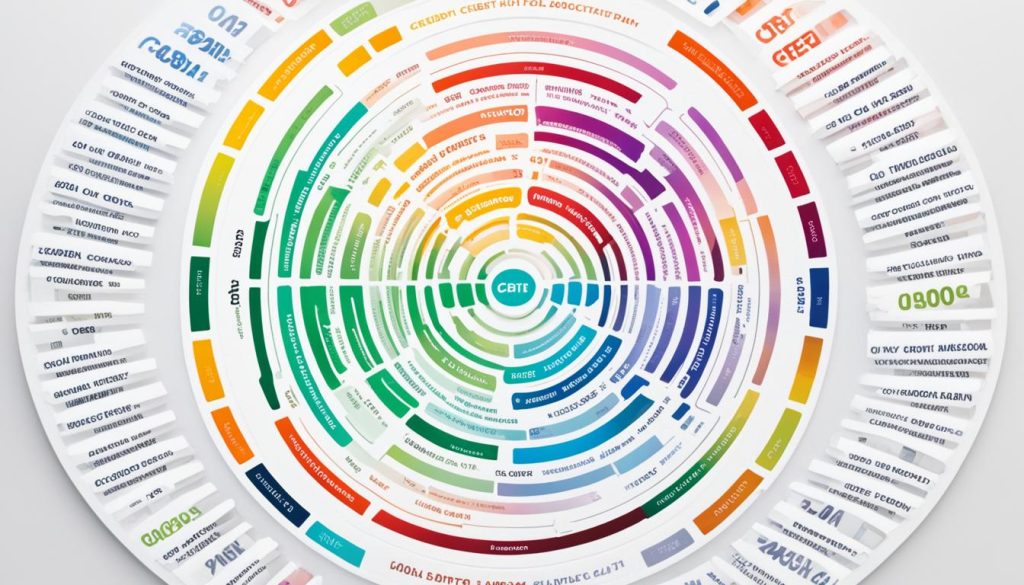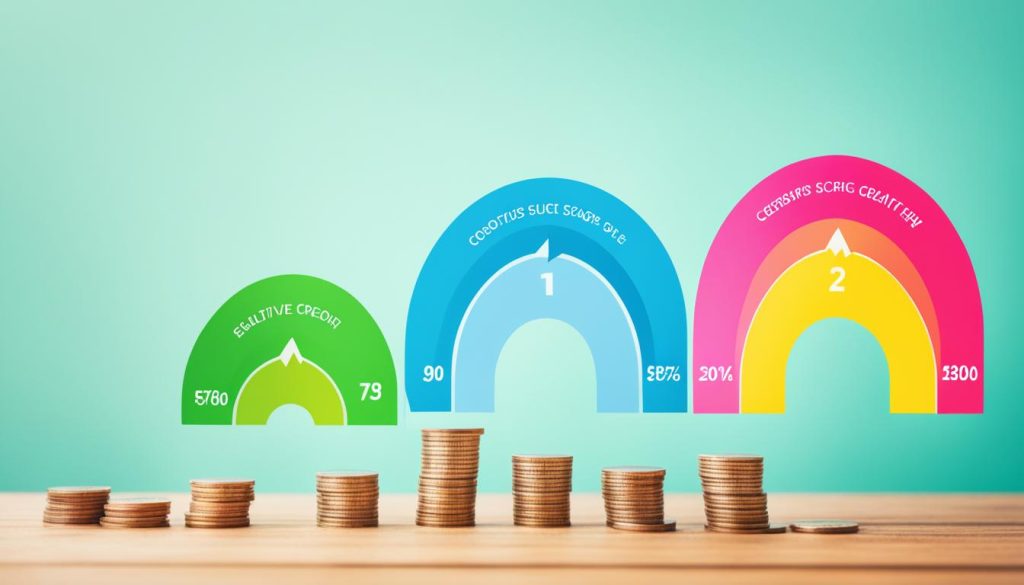Your credit score is key when lenders check if you’re good for a loan. It helps decide on loan terms, interest rates, and financing options1. Improving your score means better loan terms and lower interest rates1.
This guide will show you how to boost your credit score. You’ll learn about the main factors that affect your score and how to improve them. By doing so, you’ll become a more attractive borrower. This can lead to better loan terms for your goals.
Key Takeaways
- A credit score of 850 is considered a perfect score using the FICO model1.
- Payment history is the most important factor, contributing 35% to your credit score2.
- Credit utilization, or the amount of available credit you’re using, makes up 30% of your credit score2.
- Maintaining a diverse credit mix and limiting new credit applications can also positively impact your score1.
- Improving your credit score can lead to better loan terms, lower interest rates, and more favorable financing options1.
Make On-Time Payments
Payment history is key to your credit score, making up 35% of your FICO® Score34. It’s vital to pay all bills on time, like credit cards and loans4. To help, set up automatic payments or use calendar reminders.
Missing payments, even a few days late, hurts your FICO Score4. A collection account can stay on your report for seven years after you pay it off4. On-time payments show you’re financially responsible and can boost your creditworthiness over time.
Establish Automatic Payments
Automatic payments ensure you never forget due dates. This helps you dodge late fees and the credit score hit from missed payments3. Calendar reminders can also keep you on track with your payments.
Monitor Your Credit Report
Checking your credit report often is key to a good credit score. You can get one free report yearly at www.annualcreditreport.com3. Reviewing it lets you spot mistakes or fraud and fix them, improving your credit.
“Making on-time payments is one of the most effective ways to improve your credit score and demonstrate your creditworthiness to lenders.”
| Credit Score Factor | Percentage of FICO® Score |
|---|---|
| Payment History | 35% |
| Credit Utilization | 30% |
| Length of Credit History | 15% |
| Types of Credit Used | 10% |
| New Credit | 10% |
Pay Down Revolving Account Balances
Your credit utilization rate is key to your credit score5. Experts say keep your credit card balances low, under 30% of your total credit, for a better score5. Managing your credit well can boost your creditworthiness and lead to better loan terms later.
Debt consolidation is a good way to lower your credit utilization. Use a debt consolidation loan or a balance transfer credit card to tackle high-interest debt5. This approach can simplify your payments, lower interest rates, and improve your credit score by reducing your credit use5. A debt management plan can also help manage credit card debt and enhance your credit profile.
The Importance of Credit Utilization
Your credit utilization ratio, or how much credit you use versus what you have, makes up about 30% of your FICO® Score5. It’s vital to keep this ratio low, as high rates can hurt your creditworthiness6. Experts suggest keeping it under 30%, aiming for single digits for the best score56.
Using revolving credit like credit cards wisely can help your credit score. By borrowing responsibly over time, you build a solid credit history. This can also improve your credit mix, which is 10% of your FICO® Score56.
“Keeping your credit card balances low, ideally below 30% of your total available credit, can have a significant positive impact on your score.”
Don’t Close Your Oldest Account
Improving your credit score is easier when you keep your credit history long. The length of your credit history is 15-20% of your FICO® Score7. Keeping your oldest credit accounts open helps keep this important part of your credit score strong.
It might seem smart to close credit cards after paying off the balance. But, closing them can actually lower your credit score. It reduces the average age of your accounts, which is key to showing you’re creditworthy8. Experts say to keep even your oldest, unused credit cards open. This keeps your credit history long and your credit utilization low.
Perfect credit scores often come from having credit accounts that are 30 years old, according to FICO7. Even if your credit score is just fair, around 620, your credit history’s length is still 15% of your score. This can change your score by 93 points7. Bad info on your credit report can hurt more than a short credit history. It takes seven years for many negative marks to disappear from your report7.
So, instead of closing your oldest credit card, use it sometimes or set up a small recurring bill. This keeps your credit history age up and your credit profile strong8. With patience and good credit habits, you can keep improving your credit score over time.
Diversify the Types of Credit You Have
Building a diverse credit mix is key to improving your credit score over time. Credit mix makes up only 10% of your FICO® Score9. Yet, having different types of credit, like credit cards, loans, and mortgages, shows you can handle various debts responsibly10.
Explore Different Credit Account Types
Equifax credit reports list four main credit account types: installment loans, revolving debt, mortgage accounts, and open accounts10. Mixing these account types, not just relying on credit cards, can boost your credit score. It shows you’re good at managing different debts10.
For instance, having two credit cards, an auto loan, and a mortgage loan strengthens your credit mix more than just one credit card11. As you build your credit, aim to add various credit types. This will make your credit portfolio more diverse and improve your creditworthiness.

Remember, credit mix is a big factor, but payment history and debt levels are also key to your credit score10. Closing a paid-off credit card can hurt your score, especially if it changes your debt-to-credit ratio10.
Improving your credit score takes time and careful financial management11. By diversifying your credit and managing it well, you can boost your score. This will help you get better loan terms and interest rates in the future11109.
Limit New Credit Applications
Improving your credit score means being careful with new credit applications. Each time you apply for a credit card or loan, the lender checks your credit report12. These checks and the number of new accounts you’ve opened affect 10% of your FICO® Score12. A single check might drop your score by less than five points, but many checks in a row can hurt more1213.
Apply for new credit only when you really need it12. Use prequalification for loans or credit cards, which is a soft check that doesn’t hurt your score12. If you’re looking for a mortgage, auto loan, or student loan, FICO® Score counts multiple checks in a 45-day window as one, reducing the damage12.
Hard inquiries lessen their impact over time, and your score will likely bounce back in a few months if you keep paying on time and handle your credit well13. By applying for credit only when necessary, you can protect your score and boost your financial health.
“Virtually every time you apply for credit, the lender will run a hard inquiry on one or more of your credit reports. These inquiries and how long it’s been since you’ve opened a new account make up 10% of your FICO® Score.”
| Metric | Impact on Credit Score |
|---|---|
| Hard Inquiries | Typically fewer than 5 points per inquiry13 |
| Time on Credit Report | Hard inquiries remain on credit reports for 2 years1213 |
| Multiple Applications | Compound negative impact on credit score1213 |
By knowing how new credit applications affect your score and limiting them, you can boost your creditworthiness. This leads to better loan terms in the future.
improve credit score, loan terms, creditworthiness
Having a strong credit profile is key to getting good loan terms and boosting your creditworthiness. By using proven methods to improve your credit score, you can open up more financial opportunities. This means you’ll get better interest rates and loan conditions14.
Your payment history is a big part of your credit score, making up 35% of your FICO® Score15. Always paying on time for all your bills, like credit cards and loans, helps build a strong credit history. You might want to use automatic payments or set reminders to avoid missing payments.
Another key factor is your credit utilization ratio, which shows how much of your credit you’re using. Keeping this ratio under 30% can really help your score. If you have high-interest credit card debt, think about getting a debt consolidation loan or a balance transfer card to pay it down. This can improve your credit utilization.
| Credit Score Range | Creditworthiness Category |
|---|---|
| 300-579 | Poor Credit |
| 580-669 | Fair Credit |
| 670-739 | Good Credit |
| 740-799 | Very Good Credit |
| 800-850 | Excellent Credit |
Knowing the different credit score ranges and what they mean can help you understand your financial situation better. This can guide you in working towards a higher credit score15. A strong credit score means you’ll get better loan terms, lower interest rates, and more financial flexibility.

Building a solid credit history takes time and effort, but it’s worth it. By focusing on improving your credit score, you’ll get better loan terms and boost your creditworthiness14.
Dispute Inaccurate Information on Your Credit Report
Having wrong or fake info on your credit reports can really hurt your credit score16. In fact, the Consumer Financial Protection Bureau (CFPB) got a lot of complaints about wrong info on credit reports16. Also, a study by the Federal Trade Commission (FTC) showed that 26% of people found mistakes on their reports that made them seem riskier to lenders16.
If you spot mistakes on your credit reports, you should challenge them with the credit agencies16. The good news is that these agencies have to check these disputes in 30 days, unless they think it’s not serious16. Plus, three credit bureaus now let you file disputes online, with Experian only taking them online16.
Fixing errors on credit reports can take 30 to 90 days16. But, remember, fixing mistakes might not always make your credit score go up right away16. This is because some credit scores look at disputed accounts differently, depending on the version16. Sometimes, fixing your credit might not boost your score like you hope16.
To start a dispute, just reach out to the credit bureaus and give them any proof you have17. They usually take 30-45 days to look into it16. If they find the info is wrong, they’ll update your credit reports17.
By checking your credit reports and fixing any mistakes, you can help make your credit score better and be more creditworthy17. Remember, using the credit dispute process is key to keeping your credit info right and protecting your finances17.
“Regularly checking your credit reports is advised to ensure accuracy and completeness of information.”
Become an Authorized User
If you’re new to credit or rebuilding your credit score, ask a loved one to add you as an authorized user on their credit card. This can boost your credit score right away18. About half of these users have a score of 680 or more, which is seen as good18. The effect depends on how the credit card is handled and your credit profile.
Ask a parent or someone you trust to add you as an authorized user. Ensure the account has a good payment history and a low credit use rate18. Adding an authorized user to The Platinum Card® from American Express costs $195 a year for up to three users18. For the Chase Sapphire Reserve®, it’s $75 a year per user.
But, remember that19 not all credit scoring models count information not on your report. Being an authorized user might not help your score if the issuer doesn’t report it19. Experian doesn’t report negative payments from authorized users. But, Equifax and TransUnion say negative payments can hurt both the authorized user and the main account holder.
Becoming an authorized user on a well-managed card can help build good credit with little risk1819. It’s a great way to improve your credit score and credit building if you’re new to credit or fixing your credit history.
Conclusion
To improve your credit score20, follow the steps in this article. Paying on time and keeping your credit use low are key. Also, having a mix of credit types and fixing any mistakes helps a lot21.
These actions make your credit stronger. This can lead to better loan terms21 and more financial chances. Remember, keeping a good credit score is a long-term effort. But with discipline and patience, you can reach your financial goals and get better loan deals.
Boosting your credit score20 means you can get better loans21 and be more creditworthy. Knowing what affects your score and managing your credit well puts you in charge of your financial future. It sets you up for success over the long term.
The tips in this article, like paying on time and lowering credit use, are effective. By doing these things regularly, you build a solid credit history. This makes you a good borrower, leading to better loan terms21 and more creditworthiness.
FAQ
How can I improve my payment history and its impact on my credit score?
Your payment history is key, making up 35% of your FICO® Score. It’s vital to pay all bills on time, like credit cards and loans. Set up automatic payments or use calendar reminders to avoid missing payments.
How can I manage my credit utilization to improve my credit score?
Your credit utilization rate, at 30% of your FICO® Score, is crucial. Keep your credit card balances under 30% of your total credit to boost your score. Use a debt consolidation loan or balance transfer to reduce high-interest debt.
How does the length of my credit history affect my credit score?
Your credit history’s length, 15% of your FICO® Score, depends on your oldest account’s age and all accounts’ average age. Keep your oldest credit cards active by using them occasionally. This keeps your credit history long and healthy.
How can I improve the diversity of my credit mix?
A diverse credit mix, including credit cards, loans, and mortgages, adds 10% to your FICO® Score. This mix can enhance your credit score, though it’s not a major factor in loan or credit card approval.
How can I limit the impact of new credit applications on my credit score?
New credit applications can hurt your score with hard inquiries. These inquiries, along with new account age, make up 10% of your FICO® Score. Avoid applying for credit too often to prevent score damage.
How can I dispute inaccurate information on my credit report to improve my credit score?
Wrong info on your credit reports can lower your score. Correct errors by disputing them with the agencies, which usually takes 30 days.
How can becoming an authorized user on a loved one’s credit card help improve my credit score?
Being an authorized user can quickly boost your score if you’re new to credit or rebuilding. It depends on the account’s history and your credit mix. Ask someone with good credit to add you, ensuring their account is in good standing.
Source Links
- How to Improve Your Credit Score Fast
- How to Improve Your Credit Score Fast
- Creditworthiness: How to Check and Improve It
- How to Improve Your FICO Score | myFICO
- How Revolving Credit Affects Your Score | Bankrate
- What Affects Your Credit Scores? – Experian – Experian
- How Length of Credit History Affects Your Score | Bankrate
- Considering closing your oldest credit card? Here’s how it affects your credit score
- CredIt Mix: What It is, How It Works, Examples
- Articles
- Unlocking Financial Freedom: Improving Your Credit Score
- How Multiple Credit Applications Affect Your Credit Score – Experian
- Does Applying for a Credit Card Hurt My Credit Score? – NerdWallet
- What Is Creditworthiness?
- Why Is Good Credit So Important? | Bankrate
- How to Fix Errors on Your Credit Report | myFICO
- Articles
- Does Being An Authorized User Build Credit?
- How Being An Authorized User Affects Your Credit | Bankrate
- What Is a Credit Score? Definition, Factors, and Ways to Raise It
- Why Your Credit Score Is Important – NerdWallet

